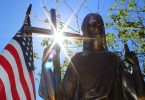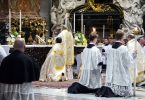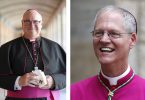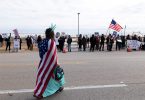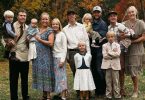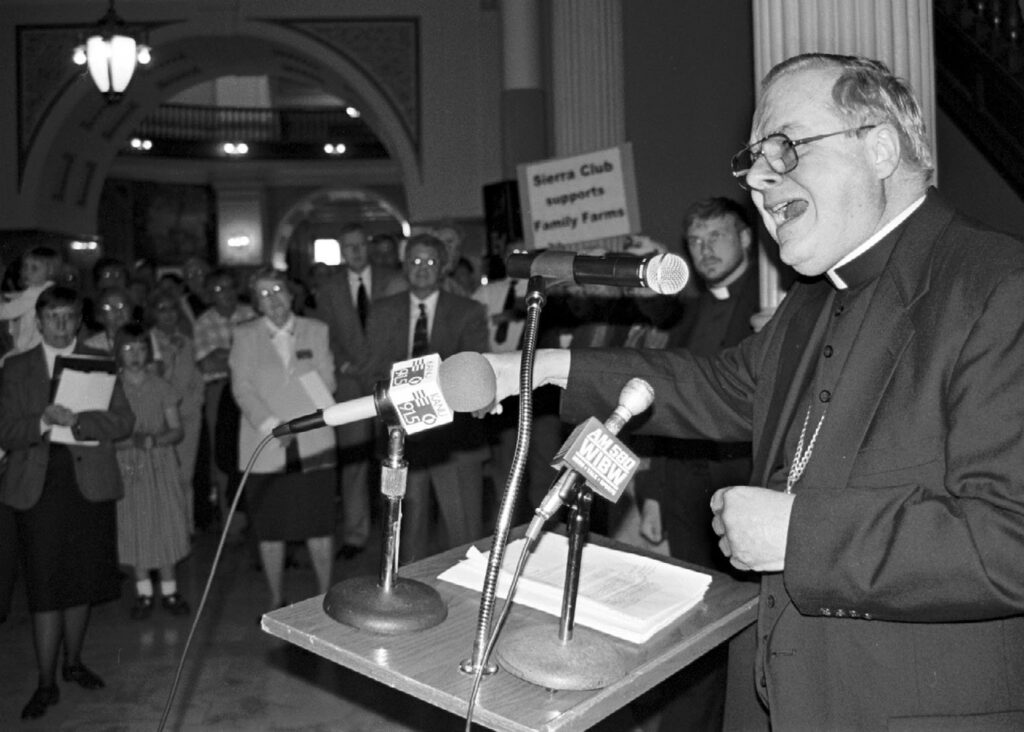
by OSV News
KANSAS CITY, Kan. (OSV News) — Retired Archbishop James P. Keleher of Kansas City died of natural causes in his home at the Santa Marta Retirement Community in Olathe Nov. 9. He was 93.
A Chicago native, the late archbishop headed the Archdiocese of Kansas City in Kansas from his installation Sept. 8, 1993, until he retired Jan. 15, 2005. During retirement, he continued to assist his successor, Archbishop Joseph F. Naumann, in various ministries as his health permitted.
“I am deeply saddened by the loss of Archbishop James P. Keleher, who passed away today,” Archbishop Naumann said in a Facebook post. “He was a great friend, mentor and wonderful shepherd who served as archbishop of the Archdiocese of Kansas City in Kansas for 11 years. I will miss him dearly.”
“Please join me in praying for Archbishop Keleher and for the comfort of the many people who knew and loved him,” he said. “Eternal rest grant unto him, O Lord, and let perpetual light shine upon him. May his soul and the souls of the faithful departed, through the mercy of God, rest in peace. Amen.”
A funeral Mass will be celebrated at 11 a.m Nov. 18, at Curé of Ars Church in Leawood, with Archbishop Naumann as the main celebrant. Burial will be at Gate of Heaven Cemetery in Kansas City.
Before being named the third archbishop of Kansas City, Archbishop Keleher was the bishop of Belleville, Illinois. Before that, as a Chicago archdiocesan priest, he served as a chaplain and associate pastor in his home archdiocese and was an archdiocesan consultor and a member of the archdiocesan liturgical commission. He also taught seminarians and was a former seminary rector.
On the national level, Archbishop Keleher held several leadership posts in the U.S. Conference of Catholic Bishops, including as treasurer. He chaired a couple of ad hoc committees, on the Economic Concerns of the Holy See and on Shrines.
In addition, he was an adviser and past chairman of what was then called the USCCB’s Committee on Priestly Formation, a consultant to the migration committee and a member of the Ad Hoc Committee on Stewardship.
In 2000, Archbishop Keleher spoke out forcefully on behalf of farming as part of a rally at the state Capitol in Topeka. He joined family farmers, state legislators, clergy, agriculture activists and assorted lobbyists in warning that America’s farm crisis may someday become a food crisis if state and federal governments do not halt the decline of family-owned farms. In 2001 and 2002, he joined the state’s other Catholic bishops in issuing white papers encouraging dialogue about farm life and efforts to preserve small farms and rural life.
In 2004, a presidential election year, the archbishop asked all Catholic institutions in the archdiocese not to invite “any person in the pro-choice movement, or any politician who espouses the pro-choice movement or has a voting record endorsing pro-choice legislation” to speak at those institutions. He cited “the importance of the issue of legalized abortion in our country, which has resulted in the killing of over 40 million unborn babies in the last 31 years since the Supreme Court decision of Roe vs. Wade.”
His statement came a day after Kansas Gov. Kathleen Sebelius, a Catholic who supported keeping abortion legal, spoke at the University of St. Mary in Leavenworth. The school, which had invited Sebelius to deliver its annual lecture honoring Abraham Lincoln, said in response that it respected the archbishop’s statement. “(We) honor the sanctity of life” as “a Catholic liberal arts institution.”
James Patrick Keleher was born on July 31, 1931, on the South Side of Chicago. He was one of two children of James and Rita (Cullinane) Keleher. The family belonged to St. Felicitas Parish.
His father was a salesman for Will & Baumer Candle Co., which supplied area parishes. His mother, an immigrant from Ireland, was a nurse before becoming a homemaker.
He attended Mount Carmel High School for one year before he entered Archbishop Quigley Preparatory Seminary. After graduating from the minor seminary in 1951, he entered the University of St. Mary of the Lake/Mundelein Seminary in Mundelein, Illinois. He graduated and was ordained a priest for the Chicago Archdiocese on April 12, 1958, in the Chapel of the Immaculate Conception at St. Mary of the Lake by Cardinal Samuel Stritch.
Following his ordination, Father Keleher continued his studies at St. Mary of the Lake and graduated with a doctorate in sacred theology in 1962. He served as chaplain from 1958 to 1961 at the convent of the Benedictine Sisters of Perpetual Adoration.
He was a teacher and academic dean at Quigley Preparatory Seminary North from 1961 to 1969. Father Keleher served as associate pastor from 1961 to 1963 at St. Henry Parish in the Rogers Park neighborhood of Chicago.
In 1966, he was named the academic dean and taught religion and social studies at Quigley North. While there, he graduated with a master’s degree in educational administration from Loyola University Chicago in 1967. He also did postdoctoral work in spirituality at the Pontifical Gregorian University in Rome.
Father Keleher served as acting dean of studies and dean of formation from 1969 to 1972 at Niles College Seminary in Chicago.
From 1975 to 1978, he was rector of Quigley South. He became dean of formation and a teacher at St. Mary of the Lake in 1972 and was appointed president and rector in 1978.
On Oct. 23, 1984, St. John Paul II appointed Father Keleher the sixth bishop of the Diocese of Belleville, Illinois. He was consecrated bishop on Dec. 11, 1984, and served until 1993, when on June 28 of that year St. John Paul appointed him Kansas City’s archbishop, succeeding Archbishop Ignatius J. Strecker.
As retirement age approached, Archbishop Keleher asked the pope for a successor to ensure a smooth transition, so on Jan. 7, 2004, the pontiff appointed then-Bishop Naumann, a St. Louis auxiliary, as coadjutor archbishop. Archbishop Keleher submitted his letter of resignation to Pope Benedict XVI Jan. 15, 2005, and became archbishop emeritus.
Archbishop Keleher was preceded in death by his parents and sister Rita Zick. He is survived by two nephews, Steven and Robert (Kim) Zick, both of Chicago, a niece, Dianne James, of Boston, five great nieces and nephews and numerous cousins, both in the United States and in Ireland.

